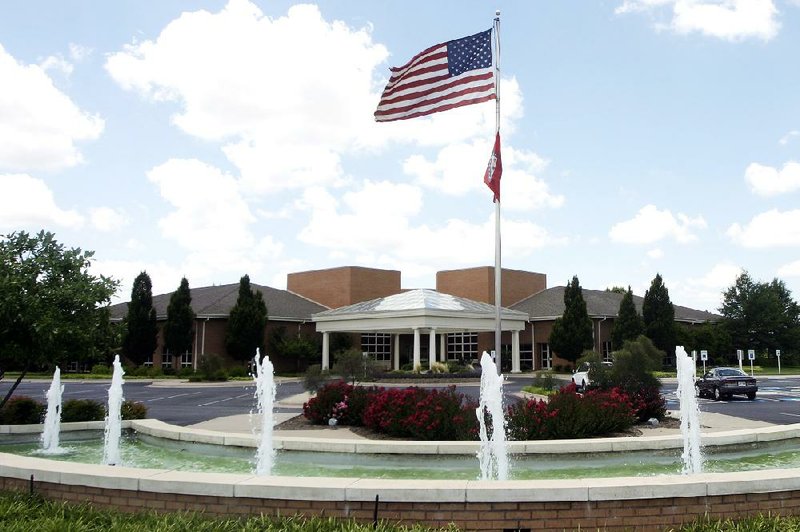A $3.5 million Affordable Care Act grant to the Schmieding Center for Senior Health and Education will allow the center to expand its homegrown caregiver training in Arkansas and three other states that have adopted it.
In 2005, the Springdalebased center developed theElderStay@home Family Caregiver series, which included versions for professional care givers and family members.
The course teaches skills such as how to move someone from bed to wheelchair without hurting the patient or the caregiver, and how to properly bathe and groom someone.
In almost all states, there is no licensing or certification for in-home caregivers unless Medicaid reimbursement is involved, said Dr. Larry D. Wright, the center’s executive director, adding that Medicare doesn’t cover long-term care.
“The American public assumes we require training, but it’s not true,” he said.
“Right now we require more training for people who do dog grooming.”
In addition to the Springdale site, curriculum expansions during the three-year grant period will happen at the University of Hawaii, Kapi’olani Community College, in Honolulu; WISE & Healthy Aging of Santa Monica, Calif.; and Central Texas Aging & Disability Resource Center of Belton, Texas.
“We are on board,” the head of the Texas agency, Richard McGhee, wrote in an e-mail Friday afternoon. “Have found the curriculum very beneficial to our veterans-directed home and community-based services program.”
The three-year federal grant is one of 81 new Health Innovation Awards the new health care law is providing.
The U.S. Supreme Court is expected to rule soon on the constitutionality of the Affordable Care Act of 2010, President Barack Obama’s health-care overhaul legislation.
The Schmieding curriculum includes two workshops for those who want to care for family members or other loved ones at home.
For career professionals, it is a 116-hour training program that offers four levels of certification.
The grant will support adding a fifth, more advanced level of certification by adding a “40-hour module,” resulting in a more advanced nursing aide training for long-term care in the home, Wright said.
It also will help develop distance-learning delivery. An Internet broadband network initiative that the University ofArkansas for Medical Sciences has in the works will help with this, Wright said.
In 2010, Little Rock-based UAMS received a $102 million federal grant through the American Recovery and Reinvestment Act that will allow it to provide interactive video equipment and personal computers to hospitals, public libraries and local health units in the state’s 75 counties.
UAMS is a partner with the Schmieding Center, as is Northwest Health System based in Springdale.
The $3.5 million grant will also include a “microcredit financing” component, which makes small loans of up to $1,500 available for students to cover tuition and books for caregiver courses.
“The fact is, nobody pays for this kind of training,” said Claudia Beverly, director of the Arkansas Aging Initiative, part of UAMS’ Donald W. Reynolds Institute on Aging. Those who want to become caregivers often don’t have the money themselves, she added.
That is a loss for families who want to keep their loved ones at home and out of nursing homes and assisted living.
“Historically what has happened is individuals have not had the help to take care of a loved one,” Beverly said. “It just wears them out.”
Frequently, she said, the stress means the caregiving spouse or other family memberbegins having health problems of their own.
As executive director of the Harrison-based Area Agency on Aging of Northwest Arkansas, Jerry L. Mitchell oversees a crew of more than 500 in-home care workers.
“One of the major issues is trying to keep those people trained,” he said.
For both professionals and relatives, training is important, Mitchell said, giving an example.
“You could hurt them if you end up turning them wrong,” he said, adding that caregivers also risk hurting themselves.
Wright said the shortage of quantity and quality in-home care is becoming ever more critical as the so-called baby boomer generation began turning 65 within the last year.
Baby boomers - defined by the U.S. Census Bureau as those born from 1946-64 - are expected to double the 65-plus population during roughly the next two decades, Wright said.
“And the over-85 group is going to be four times as big,” he added.
Forecasters expect boomers to live, on average, three decades longer than any generation in history, putting pressure on the health-care and social services systems at a time when retiring boomer doctors and nurses threaten to make shortages in those professions even worse, he said.
Northwest Arkansas, Pages 8 on 06/23/2012

